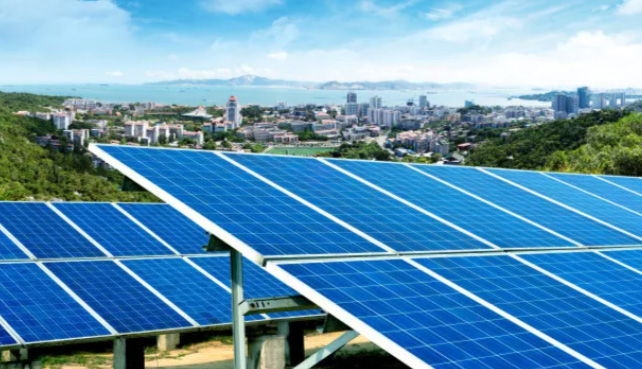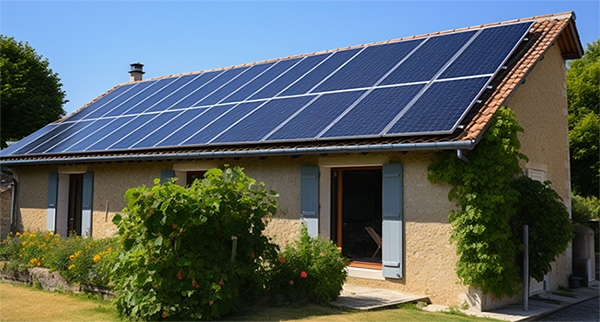In today's world, energy issues have become the focus of global attention. With the gradual depletion of fossil fuels and the increasing severity of environmental pollution, finding clean, renewable energy alternatives has become the top priority for governments and scientific research institutions around the world. As an inexhaustible clean energy source, solar energy has a broad application prospect in the field of electricity. This blog will explore in depth why solar energy is so important to electricity, and analyze the advantages, challenges, and future development trends of solar power generation from multiple perspectives.
Basics and Benefits of Solar Power Generation
First, Inverter Online Store would like to briefly explain the basic principles and advantages of solar power generation. Solar power generation refers to the process of converting solar radiation energy directly into electrical energy. At present, there are two main ways of solar power generation: photovoltaic power generation and photothermal power generation, among which photovoltaic power generation occupies a dominant position. Photovoltaic power generation uses solar panels to convert sunlight into direct current and then converts it through an inverter into alternating current needed by users such as homes and businesses. Solar power generation has the following significant advantages:
- Clean and Pollution-Free: The solar power generation process does not produce greenhouse gases and other harmful substances, and is environmentally friendly and in line with the concept of green development.
- Highly Renewable: Solar energy is an almost infinite energy source. As long as the sun exists, it can continuously generate electricity, avoiding the problem of fossil fuel depletion.
- Widespread Availability: Solar energy resources are all over the world. Whether in deserts, grasslands, or cities, solar power generation equipment can be installed wherever there is sunlight.
- Economic Potential: With the advancement of technology and the reduction of costs, the economics of solar power generation have gradually improved, and more and more regions and households can afford solar power generation systems.
- Energy Security: Solar power generation reduces dependence on external energy, enhances energy self-sufficiency, and helps maintain national energy security.

Two Key Components of Solar Power Systems
1. Solar Generator
A solar generator is a device that converts solar energy into electrical energy. Solar generators offer many significant advantages over traditional fossil fuel generators:
- Eco-Friendly: Solar power generation does not produce greenhouse gases and other harmful substances, and does not pollute the environment. It is one of the key technologies to achieve green energy transformation.
- Renewable: Solar energy is an almost infinite energy source that can continue to generate electricity as long as the sun exists, avoiding the problem of fossil fuel depletion.
- Cost-Effective: With the continuous advancement of technology and large-scale production, the cost of solar power generation has been significantly reduced, and more and more regions and households can afford solar power generation systems.
- Decentralized Power: Solar power generation systems can be installed at multiple levels, including homes, businesses, and communities, to achieve decentralization and localization of power supply and reduce dependence on large power grids.
- Flexible: Solar power generation systems can be combined with energy storage devices (such as batteries) to achieve flexible dispatch of power supply, especially when power grid failures or power outages occur, and can be used as emergency power sources.
2. Sine Wave Inverter
In solar power generation systems, sine wave inverters are a vital component. It converts direct current (DC) generated by solar generators into alternating current (AC) commonly used in homes and businesses, ensuring the normal operation of electrical equipment. Sine wave inverters are important for the following reasons:
- Power Quality: The power waveform output by the sine wave inverter is the same as the waveform of the power grid, that is, the sine wave. This ensures the stable operation of power equipment and avoids equipment damage or performance degradation caused by unstable power waveforms.
- Compatibility: Most household appliances and electronic devices are designed to operate on sine wave AC power, and the sine wave inverter ensures that the solar power generation system can be seamlessly connected to the existing power grid to provide power for these devices.
- Efficiency and Reliability: The sine wave inverter has high efficiency and high reliability, which can maximize the conversion of the power generated by the solar generator into usable alternating current while ensuring stability and durability during long-term operation.
Importance of Solar Power in the Electricity Sector
The importance of solar power generation in the power sector is mainly reflected in the following aspects:
- Optimizing Energy Structure: As clean energy, the large-scale application of solar power generation helps to optimize the energy structure, reduce the proportion of fossil fuels in power production, reduce greenhouse gas emissions, and achieve sustainable energy development.
- Enhanced Power Supply Reliability: The solar power generation system can be connected to the power grid to achieve power complementarity. When the power grid fails or the power outage occurs, the solar power generation system can be used as an emergency power supply to improve the reliability of power supply.
- Economic Growth: The development of the solar power generation industry has driven the development of related industrial chains, including solar panel manufacturing, inverter production, system integration, etc., providing new impetus for economic growth.
- Driving Innovation: Technological innovations in the field of solar power generation continue to emerge, such as high-efficiency solar cells, intelligent tracking systems, energy storage technologies, etc. These innovations not only improve the efficiency of solar power generation but also promote technological progress in the entire energy field.
- Supporting Energy Transition: Solar power generation is one of the important ways to achieve energy transformation. With the continuous maturity of solar power generation technology and the further reduction of costs, solar energy will become the main force in the future power sector.

Challenges and Solutions in Solar Power Generation
Although solar power generation has many advantages, it still faces some challenges in its actual application:
- Uneven Distribution of Sunlight: The uneven distribution of light resources in different regions leads to differences in the efficiency and benefits of solar power generation. Solutions include developing energy storage technology and building cross-regional power transmission networks.
- High Initial Investment: Although the cost of solar power generation has been greatly reduced, its initial investment is still relatively high compared to traditional energy. The government can reduce the investment cost of users by providing subsidies, tax incentives, and other policies.
- Grid Integration Issues: The grid-connected operation of large-scale solar power generation systems poses certain challenges to the safe and stable operation of the power grid. Solutions include strengthening grid infrastructure construction and optimizing grid dispatching.
- Storage Limitations: The current cost of energy storage technology is high and the energy storage capacity is limited, which affects the continuity and stability of solar power generation. Solutions include developing new energy storage technologies and improving energy storage efficiency.
Future Trends in Solar Power Generation
Looking to the future, solar power generation will show the following development trends:
- Technological Advances and Cost Reductions: With the continuous advancement of technology and large-scale production, the cost of solar power generation will continue to decrease and the efficiency will continue to increase. This will further promote the popularity and application of solar power generation.
- Intelligent and Networked Systems: Future solar power generation systems will be more intelligent and networked. Through the IoT, big data, and other technologies, remote monitoring and optimal scheduling of solar power generation systems can be achieved to improve the operating efficiency and reliability of the system.
- Breakthroughs in Storage: Energy storage technology is the key to achieving continuity and stability of solar power generation. In the future, with continuous breakthroughs and innovations in energy storage technology, energy storage costs will be significantly reduced and energy storage capacity will be significantly increased, providing strong support for the widespread application of solar power generation.
- Policy and Market Support: The government will continue introducing relevant policies to support the development of solar power generation, including subsidies, tax incentives, grid access, etc. At the same time, with the improvement of market mechanisms and the increase in user demand, solar power generation will usher in broader development prospects.
- Cross-Industry Integration: In the future, solar power generation, especially through the application of photovoltaic panels, will be integrated and innovated with other fields. For example, solar power generation (using solar panels) will be combined with new energy vehicles, smart homes, and other fields to achieve efficient use and intelligent management of energy.
Conclusion
In summary, the importance of solar energy for electricity is undeniable. As a clean, renewable, and widely available resource, solar power plays a crucial role in optimizing energy structures, enhancing power reliability, supporting economic growth, fostering technological innovation, and advancing energy transition. Although challenges remain, technological advances and policy support will propel solar power forward, making it a major force in the electricity sector and contributing to sustainable development for humanity.
